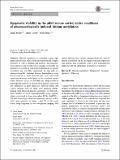Epigenetic stability in the adult mouse cortex under conditions of pharmacologically induced histone acetylation
Author(s)
Ayoub, Albert; Rakic, Pasko; Benoit, Jamie Dale
Download429_2015_Article_1138.pdf (2.937Mb)
PUBLISHER_POLICY
Publisher Policy
Article is made available in accordance with the publisher's policy and may be subject to US copyright law. Please refer to the publisher's site for terms of use.
Terms of use
Metadata
Show full item recordAbstract
Histone acetylation is considered a major epigenetic process that affects brain development and synaptic plasticity, as well as learning and memory. The transcriptional effectors and morphological changes responsible for plasticity as a result of long-term modifications to histone acetylation are not fully understood. To this end, we pharmacologically inhibited histone deacetylation using Trichostatin A in adult (6-month-old) mice and found significant increases in the levels of the acetylated histone marks H3Lys9, H3Lys14 and H4Lys12. High-resolution transcriptome analysis of diverse brain regions uncovered few differences in gene expression between treated and control animals, none of which were plasticity related. Instead, after increased histone acetylation, we detected a large number of novel transcriptionally active regions, which correspond to long non-coding RNAs (lncRNAs). We also surprisingly found no significant changes in dendritic spine plasticity in layers 1 and 2/3 of the visual cortex using long-term in vivo two-photon imaging. Our results indicate that chronic pharmacologically induced histone acetylation can be decoupled from gene expression and instead, may potentially exert a post-transcriptional effect through the differential production of lncRNAs.
Date issued
2015-11Department
Massachusetts Institute of Technology. Department of Brain and Cognitive Sciences; Picower Institute for Learning and MemoryJournal
Brain Structure and Function
Publisher
Springer Berlin Heidelberg
Citation
Benoit, Jamie, Albert Ayoub, and Pasko Rakic. “Epigenetic Stability in the Adult Mouse Cortex under Conditions of Pharmacologically Induced Histone Acetylation.” Brain Structure and Function 221.8 (2016): 3963–3978.
Version: Author's final manuscript
ISSN
1863-2653
1863-2661